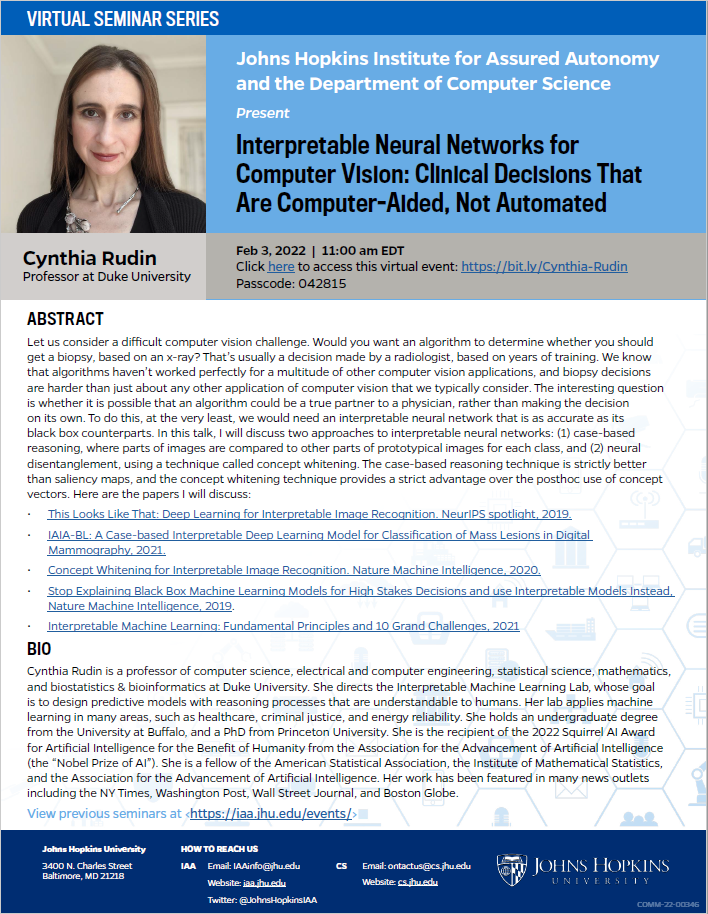Abstract: Let us consider a difficult computer vision challenge. Would you want an algorithm to determine whether you should get a biopsy, based on an x-ray? That’s usually a decision made by a radiologist, based on years of training. We know that algorithms haven’t worked perfectly for a multitude of other computer vision applications, and biopsy decisions are harder than just about any other application of computer vision that we typically consider. The interesting question is whether it is possible that an algorithm could be a true partner to a physician, rather than making the decision on its own. To do this, at the very least, we would need an interpretable neural network that is as accurate as its black box counterparts. In this talk, I will discuss two approaches to interpretable neural networks: (1) case-based reasoning, where parts of images are compared to other parts of prototypical images for each class, and (2) neural disentanglement, using a technique called concept whitening. The case-based reasoning technique is strictly better than saliency maps, and the concept whitening technique provides a strict advantage over the posthoc use of concept vectors. Here are the papers I will discuss:
-
- This Looks Like That: Deep Learning for Interpretable Image Recognition. NeurIPS spotlight, 2019. https://arxiv.org/abs/1806.10574
- IAIA-BL: A Case-based Interpretable Deep Learning Model for Classification of Mass Lesions in Digital Mammography, 2021. https://arxiv.org/abs/2103.12308
- Concept Whitening for Interpretable Image Recognition. Nature Machine Intelligence, 2020. https://rdcu.be/cbOKj
- Stop Explaining Black Box Machine Learning Models for High Stakes Decisions and use Interpretable Models Instead, Nature Machine Intelligence, 2019. https://rdcu.be/bBCPd
- Interpretable Machine Learning: Fundamental Principles and 10 Grand Challenges, 2021 https://arxiv.org/abs/2103.11251
Bio: Cynthia Rudin is a professor of computer science, electrical and computer engineering, statistical science, mathematics, and biostatistics & bioinformatics at Duke University. She directs the Interpretable Machine Learning Lab, whose goal is to design predictive models with reasoning processes that are understandable to humans. Her lab applies machine learning in many areas, such as healthcare, criminal justice, and energy reliability. She holds an undergraduate degree from the University at Buffalo, and a PhD from Princeton University. She is the recipient of the 2022 Squirrel AI Award for Artificial Intelligence for the Benefit of Humanity from the Association for the Advancement of Artificial Intelligence (the “Nobel Prize of AI”). She is a fellow of the American Statistical Association, the Institute of Mathematical Statistics, and the Association for the Advancement of Artificial Intelligence. Her work has been featured in many news outlets including the NY Times, Washington Post, Wall Street Journal, and Boston Globe.
